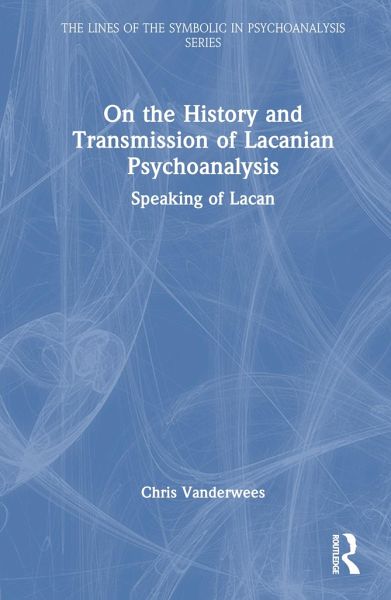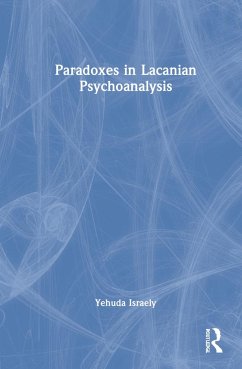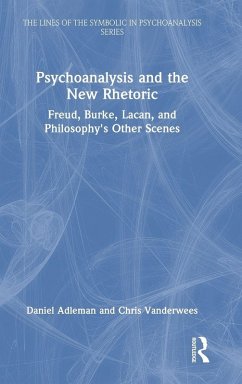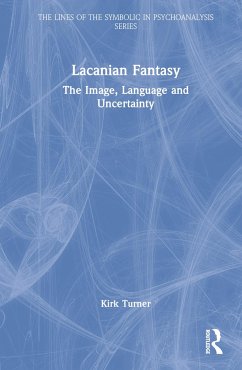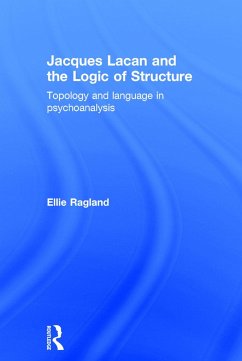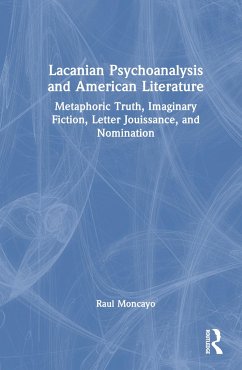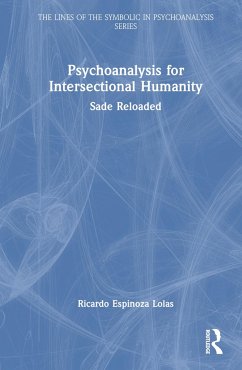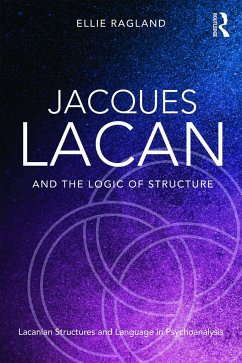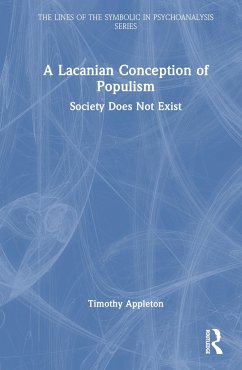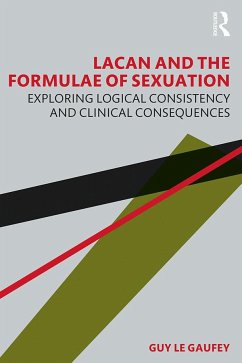Chris Vanderwees
Gebundenes Buch
On the History and Transmission of Lacanian Psychoanalysis
Speaking of Lacan
Versandkostenfrei!
Versandfertig in 1-2 Wochen
Weitere Ausgaben:

PAYBACK Punkte
77 °P sammeln!





On the History and Transmission of Lacanian Psychoanalysis addresses key questions about the history and transmission of Lacan's work in North America through discussions with experienced psychoanalysts (who are also trained psychiatrists, psychologists, and psychotherapists).
Chris Vanderwees, PhD, RP, is a psychoanalyst, registered psychotherapist, and clinical supervisor at St. John the Compassionate Mission in Toronto, Canada.
Produktdetails
- Verlag: Routledge
- Seitenzahl: 272
- Erscheinungstermin: 20. Oktober 2023
- Englisch
- Abmessung: 240mm x 161mm x 19mm
- Gewicht: 575g
- ISBN-13: 9781032346373
- ISBN-10: 103234637X
- Artikelnr.: 69949299
Herstellerkennzeichnung
Libri GmbH
Europaallee 1
36244 Bad Hersfeld
gpsr@libri.de
"On the History and Transmission of Lacanian Psychoanalysis reminds us of what is most revolutionary and subversive about Lacan's psychoanalytic undertaking. Vanderwees traces multiple exploratory routes, mapping Lacanian discourse and practice as it has been utilized and revitalized at diverse institutional, global and historical sites. What emerges, in this careful and collaborative book, is a rich and textured overview, one which reminds us that there is no one Lacan, and that the Lacanian psychoanalytic adventure - like desire itself - necessarily resists domestication, uniformity, or a reduction to any one discourse of mastery."
Derek Hook, PhD, Associate Professor of Psychology, Duquesne University;
Derek Hook, PhD, Associate Professor of Psychology, Duquesne University;
Mehr anzeigen
author, Six Moments in Lacan
"In this book, Chris Vanderwees converses with significant figures in Lacanian psychoanalysis whose deeply personal relationships to psychoanalysis are interwoven with a tapestry of Lacanian movements they inspired in North America, Mexico, and Europe. The result is a vibrant collection beautifully rendered in conversations that exceed dialogics at every turn by contextually transmitting the desire of the analyst and the logic of Lacan's formulations against scientific empiricism, the post-Freudian 'institutionalisation' of psychoanalysis, and dogmas of neoliberally inspired therapies. This book serves as an important beacon of alterity, openness, and inspiration - literally the power of interlocution."
Eve Watson, PhD, psychoanalyst; co-editor of Critical Essays on the Drive: Lacanian Theory and Practice (Routledge, 2023)
"On the History and Transmission of Lacanian Psychoanalysis, Chris Vanderwees' masterful collection of interviews with Lacanians is like an all-access, backstage pass to the Coachella of psychoanalysis. They're all here, the most important practitioners in the field today: from the Willy Apollon, Danielle Bergeron, and Lucie Cantin cohort in Québec to the Cormac Gallagher coterie in Ireland, from the Après-Coup New Yorkers to crucial Lacan translator Dan Collins, from knots with Ellie Ragland to welcome appendices on François Peraldi and William Richardson. Certain themes emerge that will engage - or perhaps enrage, or enrapture - readers: the usefulness of interpretation and clinical orthodoxies, the marginal status of Lacan in the Americas, on whether we should read Melanie Klein (or Jung!), and perhaps the most important question: is psychoanalysis dialectics? Only a reading of these dialogues will answer that question, and we are to thank Vanderwees for being a generous, and also rigorous, guide to the psychoanalytic scene today."
Clint Burnham, PhD, Professor of English, Simon Fraser University
"What would it mean to transmit our knowledge of psychoanalytic practice? Is this even possible? These questions, which are already questions of theory, of practice, of coherence, of ethics...of the very possibility of psychoanalysis itself, urgently require some response. This marvelous book gathers some such responses and opens up a vital conversation which is essential to the future of the discipline. It is essential reading for anyone and everyone interested in the field, whether as an analyst, a theorist or an analysand."
Calum Neill, PhD, Associate Professor of Psychoanalysis & Cultural Theory, Edinburgh Napier University
"In this book, Chris Vanderwees converses with significant figures in Lacanian psychoanalysis whose deeply personal relationships to psychoanalysis are interwoven with a tapestry of Lacanian movements they inspired in North America, Mexico, and Europe. The result is a vibrant collection beautifully rendered in conversations that exceed dialogics at every turn by contextually transmitting the desire of the analyst and the logic of Lacan's formulations against scientific empiricism, the post-Freudian 'institutionalisation' of psychoanalysis, and dogmas of neoliberally inspired therapies. This book serves as an important beacon of alterity, openness, and inspiration - literally the power of interlocution."
Eve Watson, PhD, psychoanalyst; co-editor of Critical Essays on the Drive: Lacanian Theory and Practice (Routledge, 2023)
"On the History and Transmission of Lacanian Psychoanalysis, Chris Vanderwees' masterful collection of interviews with Lacanians is like an all-access, backstage pass to the Coachella of psychoanalysis. They're all here, the most important practitioners in the field today: from the Willy Apollon, Danielle Bergeron, and Lucie Cantin cohort in Québec to the Cormac Gallagher coterie in Ireland, from the Après-Coup New Yorkers to crucial Lacan translator Dan Collins, from knots with Ellie Ragland to welcome appendices on François Peraldi and William Richardson. Certain themes emerge that will engage - or perhaps enrage, or enrapture - readers: the usefulness of interpretation and clinical orthodoxies, the marginal status of Lacan in the Americas, on whether we should read Melanie Klein (or Jung!), and perhaps the most important question: is psychoanalysis dialectics? Only a reading of these dialogues will answer that question, and we are to thank Vanderwees for being a generous, and also rigorous, guide to the psychoanalytic scene today."
Clint Burnham, PhD, Professor of English, Simon Fraser University
"What would it mean to transmit our knowledge of psychoanalytic practice? Is this even possible? These questions, which are already questions of theory, of practice, of coherence, of ethics...of the very possibility of psychoanalysis itself, urgently require some response. This marvelous book gathers some such responses and opens up a vital conversation which is essential to the future of the discipline. It is essential reading for anyone and everyone interested in the field, whether as an analyst, a theorist or an analysand."
Calum Neill, PhD, Associate Professor of Psychoanalysis & Cultural Theory, Edinburgh Napier University
Schließen
Für dieses Produkt wurde noch keine Bewertung abgegeben. Wir würden uns sehr freuen, wenn du die erste Bewertung schreibst!
Eine Bewertung schreiben
Eine Bewertung schreiben
Andere Kunden interessierten sich für




